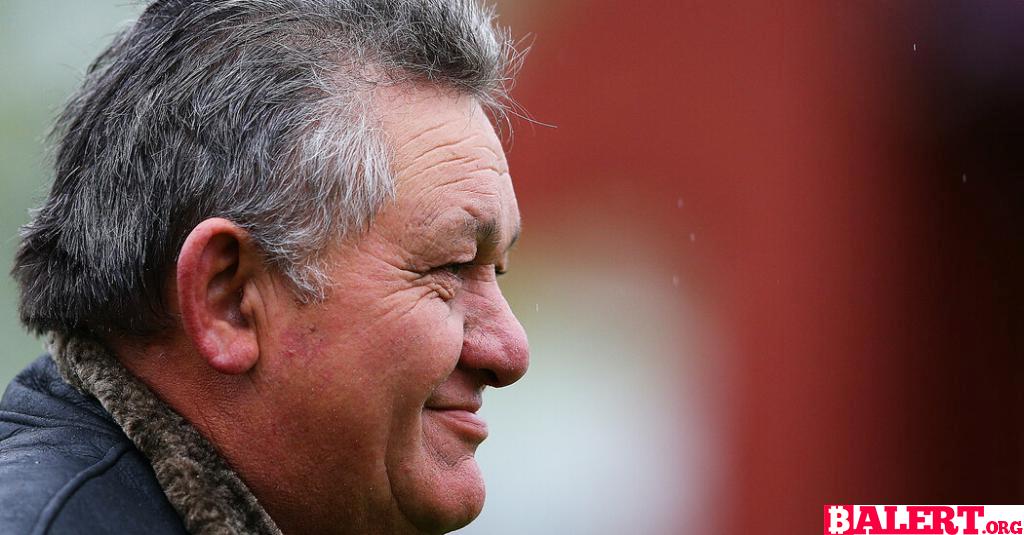World
Tribute to Kiingi Tuheitia: Remembering the Maori King’s Legacy of Unity
Explore the enduring legacy of Kiingi Tuheitia, the Maori King, as we celebrate his contributions to unity and cultural identity. Join us in remembering a leader whose vision and spirit continue to inspire communities.

Tribute to Kiingi Tuheitia: A Legacy of Unity and Leadership
Kiingi Tuheitia, the esteemed Maori king, who fervently championed unity among New Zealand’s Indigenous tribes throughout his 18-year reign, passed away on Friday at the age of 69. The news of his demise was shared on social media platforms by the Kiingitanga, the Maori King Movement, although no specific cause of death was disclosed. It was reported that the king had been recuperating in a hospital following heart surgery.
Rahui Papa, a spokesperson for the Kiingitanga, expressed the collective sorrow felt across Maoridom and New Zealand, stating, “The death of Kiingi Tuheitia is a moment of great sadness for followers of Te Kiingitanga, Maoridom and the entire nation.” In a poignant tribute, he referred to the king as a chief who has transitioned to the great beyond, emphasizing the deep cultural significance of this loss.
In honor of the king’s passing, Radio New Zealand, a public broadcaster, reported that all public buildings would display the national flag at half-staff. Prime Minister Christopher Luxon commended the king’s “unwavering commitment to his people and his tireless efforts to uphold the values and traditions of the Kiingitanga.”
The Maori monarchy, a symbolic institution established in 1858, was created to unite Maori tribes in the face of colonial threats, as outlined by New Zealand’s Ministry for Culture and Heritage. Kiingi Tuheitia, whose full name was Kiingi Tuheitia Pootatau Te Wherowhero VII, was the seventh monarch, having succeeded his mother, Queen Dame Te Atairangikaahu, upon her passing in 2006.
Celebrated during his coronation ceremony in 2006, Kiingi Tuheitia became a pivotal figure in Maori leadership. As of November 2022, the Maori population in New Zealand was estimated at 892,200, comprising 17.4 percent of the nation’s populace, according to official government statistics.
The election of Prime Minister Luxon’s conservative government last year raised concerns among many Maori, particularly as some party leaders proposed dismantling pro-Maori policies, including the widespread official use of the Maori language. In response, Kiingi Tuheitia convened a national assembly for Maori communities to hold the coalition government accountable, drawing thousands of attendees, as reported by Radio New Zealand.
Despite tensions, Kiingi Tuheitia urged participants at the meeting, “The best protest we can do right now is be Maori,” highlighting his commitment to cultural identity and resilience. Former Prime Minister Jacinda Ardern lauded him as an “advocate for Maori, for fairness, justice, and prosperity,” reflecting the widespread respect he garnered throughout his life.
Born Tuheitia Paki in 1955 in Huntly, New Zealand, Kiingi Tuheitia had recently celebrated the 18th anniversary of his coronation. Throughout his reign, he engaged with royal families, government officials, foreign diplomats, and international leaders, fostering connections that transcended borders.
Following his death, he will lie in state for five days at Turangawaewae Marae, the spiritual home of the Maori King Movement, before being laid to rest at Taupiri, as per local news reports. At this time, no successor has been announced; however, according to Radio New Zealand, a new leader will be chosen by the heads of the tribes associated with the Kiingitanga on the final day of his tangi, or funeral.
Kiingi Tuheitia is survived by his wife, Makau Ariki, and their children: Whatumoana, Korotangi, and Ngawai Hono I Te Po, who will continue his legacy in the spirit of unity and cultural pride.
World
Dominique Pelicot Testifies in Harrowing Rape Trial
Join us as Dominique Pelicot courageously testifies in a harrowing rape trial, shedding light on the complexities of trauma and justice. Her powerful story raises crucial questions about the legal system and the importance of support for survivors.

Dominique Pelicot Takes the Stand in Shocking Rape Trial
In a courtroom drama that has captivated France and garnered international attention, Dominique Pelicot, the man at the center of a harrowing rape trial, finally addressed the court. With tears streaming down his face, he recounted how his wife had been instrumental in helping him cope with a tumultuous past marked by trauma. He revealed that he had endured a sexual assault at the tender age of nine while hospitalized, and he also witnessed a gang rape during his teenage years while working as an apprentice electrician on a construction site.
“She didn’t deserve this, I acknowledge that,” Mr. Pelicot stated, his voice barely audible as he struggled to convey his emotions. The gravity of the situation weighed heavily on him, and the courtroom fell silent, straining to catch his every word.
Now 71 years old, Mr. Pelicot faces serious allegations of drugging his wife, Gisèle Pelicot, whom he has been married to for half a century, over a span of nearly ten years. Prosecutors contend that he used drugs to render her comatose, allowing him to rape her repeatedly. Furthermore, authorities allege that he went so far as to invite numerous men into their home, facilitating a nightmarish scenario where they, too, engaged in the assault of his wife.
Overall, 51 men, including Mr. Pelicot, are on trial concurrently, primarily facing charges related to the aggravated rape of Ms. Pelicot. Among them, one individual has already pleaded guilty to similar crimes, admitting to drugging his own wife to assault her and inviting Mr. Pelicot to partake in the horrific act while she was incapacitated.
Mr. Pelicot’s unexpected testimony came after a tumultuous start to the trial. Just a week in, he was stricken with severe health issues that forced him to miss four consecutive days in court. The head judge ultimately decided to postpone proceedings, as Mr. Pelicot was diagnosed with kidney stones, a kidney infection, and prostate complications, adding yet another layer of complexity to this already harrowing case.
World
Meta Bans Russian State Media Outlets from Social Media Platforms
Explore the implications of Meta’s decision to ban Russian state media outlets from its social media platforms. Understand the impact on information dissemination and the ongoing battle against misinformation in the digital landscape.

Meta Imposes Global Ban on Russian State Media Outlets
In a significant move, Meta Platforms, Inc., the parent company of Facebook, has announced the prohibition of Russian state media outlets, including RT (Russia Today) and Rossiya Segodnya, from all its social media platforms. The decision stems from the company’s concerns regarding the deceptive strategies employed by these media organizations to execute covert influence operations across the internet.
Meta made this announcement on Monday, emphasizing that the ban will be enforced worldwide across its various platforms, such as Instagram, WhatsApp, and Threads. The rollout of this ban is expected to take place over the coming days.
Statement from Meta
A spokesperson for Meta elaborated on the decision, stating, “After careful consideration, we have expanded our ongoing enforcement actions against Russian state media outlets. As a result, Rossiya Segodnya, RT, and other affiliated entities are now banned from our applications globally due to their involvement in foreign interference activities.”
For further insights into this development, watch the video in the player above.
World
Trump Recalls Alleged Assassination Attempt While Golfing
Explore Donald Trump’s chilling recollection of an alleged assassination attempt he experienced while enjoying a round of golf. Delve into the tense moments and his reflections on safety, fame, and the unpredictability of public life.

In a recent interview on the social media platform X, Republican presidential nominee Donald Trump recounted a harrowing incident he claims to have experienced while playing golf. Trump described how, during a peaceful Sunday morning round with friends, the tranquility of the day was abruptly shattered by the sound of gunfire in the air.
“It was a beautiful day, everything was just perfect,” Trump reflected. “Then all of a sudden, we heard shots being fired—probably around four or five in total.” He went on to explain that a Secret Service agent was the first to spot the suspect, who was allegedly armed with an AK-47, a powerful assault rifle.
“The agent saw the barrel of the weapon and immediately took action, returning fire at the barrel and aiming in the direction of the bushes,” Trump detailed. “I would have loved to have sunk that last putt, but we decided it was best to leave the scene promptly.”
Trump expressed his gratitude towards the agents and a vigilant civilian who aided in tracking down the suspect, who was eventually apprehended following a high-speed chase.
Suspect Faces Multiple Federal Gun Charges
The FBI has identified the suspect as Ryan Wesley Routh, accusing him of targeting Trump during his time at the golf club in West Palm Beach, Florida. According to an FBI report, Routh had allegedly hidden among the hedges of the golf course for an astonishing 12 hours. Authorities discovered an SKS-style assault rifle, a GoPro camera, and a bag of food at the scene.
The 58-year-old Routh is now facing two serious federal gun charges. If convicted on both counts, he could face a combined maximum sentence of 20 years in prison. Notably, neither of the charges is directly related to an assassination attempt. The first charge pertains to possessing a firearm despite a prior felony conviction, which carries a potential 15-year sentence, a fine of $250,000 (€225,000), and three years of supervised release.
The second charge involves possession of a firearm with an obliterated serial number, which could result in a five-year prison term, the same financial penalties, and also three years of supervised release. As the investigation continues, additional charges could be forthcoming.
While the motive behind Routh’s actions remains unclear, his digital footprint reveals strong political affiliations, particularly concerning issues surrounding Ukraine and China. Routh consistently expressed support for Ukraine across various social media platforms, even claiming to have orchestrated a recruitment scheme for international volunteers aiming to assist Ukraine in its fight against Russia’s invasion. This behavior has been denounced by Ukrainian soldiers and members of the International Legion, who disavowed Routh’s actions and motives.
-

 Business4 months ago
Business4 months agoObituary: Dan Collins
-

 Business3 months ago
Business3 months agoThe Significance of Jackson Hole: A Central Banking Tradition
-

 Gaming5 months ago
Gaming5 months agoMore than a thousand students vowed not to work for Amazon and Google due to the Nimbus Project.
-

 World5 months ago
World5 months agoRussia and North Korea Strengthen Defense Ties
-

 Business5 months ago
Business5 months agoJump Crypto Invests $10 Million in Pro-Crypto PAC
-

 Article5 months ago
Article5 months agoCreative Design Applications Developed with Artificial Intelligence
-

 Tech2 months ago
Tech2 months agoNew Leaks and Features About the Samsung Galaxy S25 Ultra
-

 Gaming5 months ago
Gaming5 months agoThe Inspirational Success Story of Avon’s Founder Who Sold Books Door to Door














